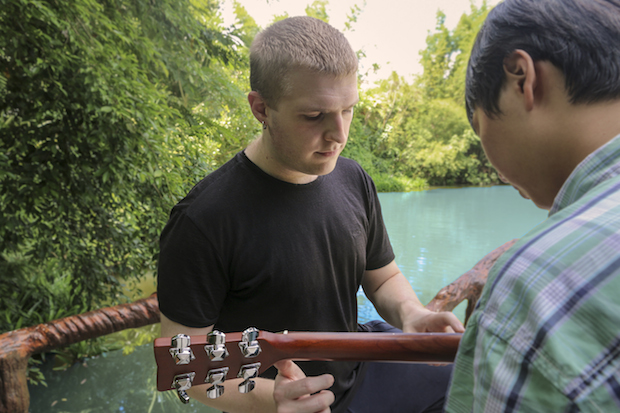How Teaching Guitar Made Me a Better Player

When someone says “guitar lessons," what kind of image does that conjure?
I think of the dingy back room of a music store, with one amp and two folding metal chairs—and not quite enough space to disperse the body odor of the two people in there.
And I think about the moment, 10 years later, when I had my own thriving lessons business. One amp, two folding chairs, a little more breathing room. And some air freshener.
Teaching isn't for everyone. It's exhausting to focus all of your attention on another person for 30 minutes. But if you aren’t sure yet, or if you haven’t begun to teach, you might be surprised to find out teaching can help make you a better guitar player.
I'm not ashamed to say I'm still new at learning the guitar, even after 10 years of trying pretty damn hard. I’m not afraid to admit I still have a long way to go. And I am happy to give credit to my students for the times when they've turned the tables around and taught me a thing or two.
Clear evidence of what drives success
Through my students, I saw clear relationships between certain habits and positive guitar progress outcomes.
All the latest guitar news, interviews, lessons, reviews, deals and more, direct to your inbox!
For example, my best students were notetakers. They kept a journal for their lessons and practice. Taking notes gives you a bird’s eye view of your guitar progress. It can help you avoid getting in a rut, so you can spend more time pushing yourself out of your comfort zone. Without notes, you are more likely to play the stuff you know or tackle challenges you’re not ready for. If you’re organized, you have a better chance of pushing yourself up to the edge of your abilities—and staying there as long as possible.
Looking in the mirror: Am I following my own advice?
I always told my students to memorize the music and rehearse regularly. I even made something I called the Carousel Method, a way to review the tunes you’ve memorized, especially as the list expands and you can’t play it all in a single session.
Then I asked: How is my memorization? It wasn’t so great. I had an accident and there were a few months where I didn’t practice much. Suddenly, I couldn’t play a single tune by heart. In just a few minutes a day, I could have preserved a long list of tunes. This was a heavy blow to someone who’s devoted the last 10 years to the guitar. When I noticed I wasn’t following my own advice, I decided to make a change.
Looking at how far I’ve travelled—but not falling behind
When you teach guitar, some students stay for years, but others don’t last a week. Most are total beginners, although some have 20 or more years of playing.
I realized how far I’ve traveled as a guitar player. I always had something to offer my students, even those who had played for decades. Of course, I met some who knew techniques I hadn’t learned. But being able to rise to the challenge of teaching anybody who came through the door made me realize I must have come a pretty long way. And the fact that there were some advanced players coming to me for help gave me a nudge that helped me see the areas in my own playing that needed improvement.
Realizing how little my insecurity matters, and letting it go
The confidence my students put in me made me realize that, from their point of view, I have nothing to be insecure about. Things look a lot differently when you’re on the outside looking in.
I realized that insecurity is an obstacle and that a vague fixation on “being good” at everything is a poorly defined goal.
I’m not the best at everything. There are some auditions I would nail and others I would fail. And that’s fine. I’m not trying to be the best at everything. That objective is just as boring as it is impossible.
Understanding that there’s still lots of time
I’m probably not the only player who ever wondered if he or she has already passed through his or her best guitar-learning years. As I get older, will I continue to improve, or have I reached the limit? Is my potential to get better starting to slow down?
After seeing people twice my age bravely pick up the axe and start sharpening it, I realized these questions are for neuroscientists, not musicians. I’m still able to see improvements in my playing every day, and that’s all that matters. The science seems to confirm that adults enjoy tremendous capacity to learn throughout their whole lives. And if that’s not good enough, I’ve seen it with my own eyes. People of all ages can learn this instrument.
Grey is the founder of Hub Guitar, which employs guitar teachers across the U.S. and publishes guitar lessons for players of all levels. He has years of experience playing guitar, teaching guitar and building online guitar lessons. You can see more of what he has written at Hub Guitar: Articles.
